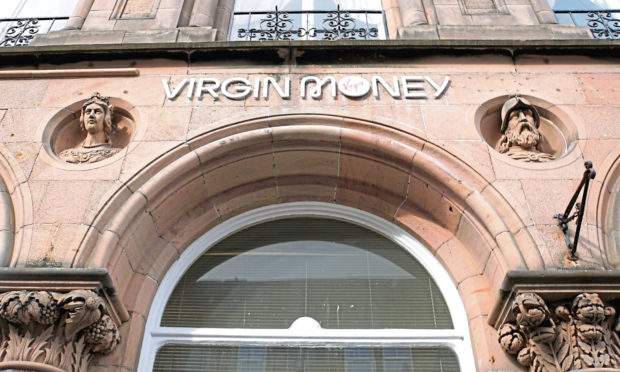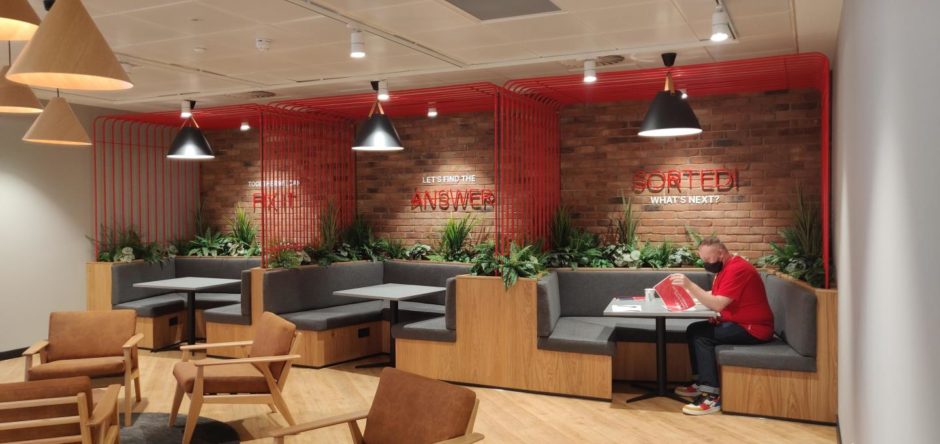The rebranding of Clydesdale Bank into Virgin Money is largely complete, the so-called “challenger” banking group has announced.
Chief financial officer Clifford Abrahams said the process of removing the Clydesdale name – and Yorkshire Bank south of the border – was “pretty much done”.
High street branches across the country have been given new signs, while customers have also seen the Virgin brand rolled out across the product portfolio.
The change of moniker for the former Clydesdale and Yorkshire businesses has given the group fresh “momentum” coming out of lockdown, Mr Abrahams said.
We are still printing them but I am not going to forecast the future.”
Clifford Abrahams, Virgin Money
But he was unable to give any long-term guarantees about the future of Clydesdale banknotes, which will be the last visible trace of the historic Scottish brand following its integration under the Virgin umbrella.
“We are still printing them but I am not going to forecast the future,” Virgin’s CFO said.
He was speaking after Virgin announced a return to the black during the six months to March 31.
The group – formerly known as CYBG – reported pre-tax profits of £72 million for the period, against losses of £7m a year earlier. On an underlying basis, interim pre-tax profits more than doubled to £245m from £120m a year ago.
Profits were boosted as impairments for bad debts fell to £38m from £232m a year earlier, at the height of the initial Covid-19 lockdown, which offset lower retail banking income due to rock-bottom interest rates.
But Virgin did not follow the lead of bigger banking rivals Lloyds Banking Group and HSBC in releasing some of the large amounts of cash put aside last year for loan losses, instead maintaining provisions at £721m.
It took a further £59m for the payment protection insurance scandal after a higher level of internal reviews into complaints led to payouts.
Personal loans dropped 3.2% to £5.1 billion in Virgin’s first half as households reined in spending and saved instead, with business lending also down 0.6% at £8bn. The group’s mortgage balance remained flat at £58.3bn.
Improving picture
Meanwhile, Virgin saw its net interest margin – a key performance measure for retail banks – fall due to record low interest rates.
But it lifted its margin outlook for the full year due to an improving picture as the economy is expected to bounce back strongly from the latest lockdown.
Chief executive David Duffy said: “We are cautiously optimistic about the improving outlook as the impact of the vaccination programme in the UK delivers positive revisions to economic expectations.
“We’re continuing to manage through what is still an uncertain economic backdrop but the bank is well-placed with a strong balance sheet.”
Virgin’s shares fell by 1.2% to 198.3p following the results announcement on Wednesday.
John Moore, senior investment manager at wealth manager Brewin Dolphin, said: “Virgin Money’s results largely mirror Lloyds’ last week, with the bank rebounding to profit, maintaining a steady net interest margin, and registering lower impairment charges.
“Virgin is also making progress on its transformation strategy and the share price has duly recovered from the lows of late last year.
“The question is what the next big move for this evolving bank will be – whether that takes the form of accelerated investment in digital and fintech, buying in small books of mortgages and loans, or consolidating and cost-cutting within the existing business.
“The share price recovery still has some way to go if Virgin is aiming for the prominence of FTSE 100 status, with a market cap of around £2.9bn, against the present cut-off of around £4.4bn, which could indicate a deal lies ahead.”
According to Mr Abrahams, Virgin has already achieved a “step change” in its evolution, gaining market share from its bigger rivals and investing heavily in its online platforms.
The bank has also shut or merged 52 branches as it shifts its focus from high street lending to digital services.
“We have challenged and we have arrived,” he said, adding: “We’ve made the transition and we really now like to think of ourselves as a full-service digital bank.”
CYBG takeover of Virgin creates challenger bank
Heritage pledge as CYBG acquires Virgin Money



